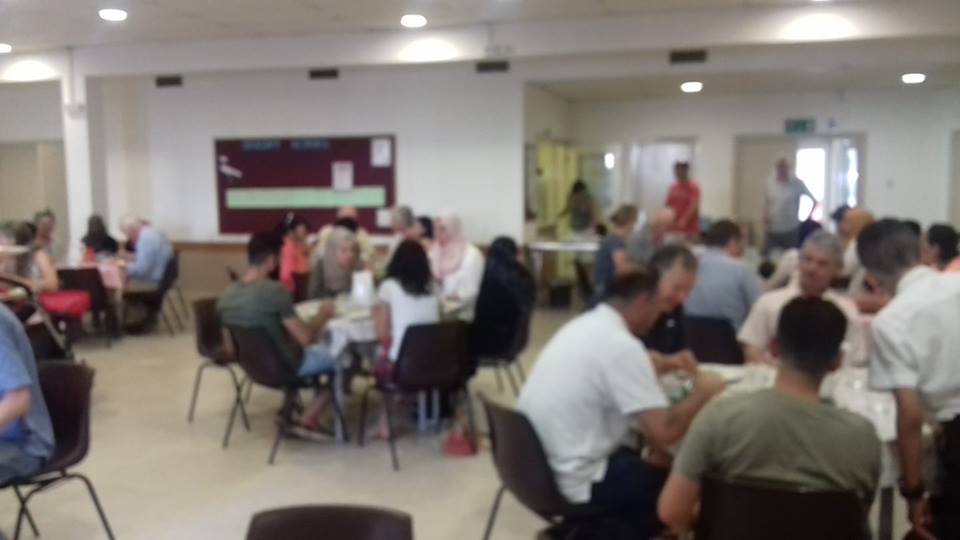Creating community through the ‘World Cafe’
Twice-monthly social events are held for between 80-150 people, sometimes even more. The asylum seekers and refugees cook meals from their own countries, with occasional British cuisine.
28 SEPTEMBER 2018 · 11:46 CET

Like the rest of Europe, life for asylum seekers in Gloucester, England, is a ‘liminal space’ where they survive and wait, knowing they could be moved by the authorities at any time.
“It is like living in an open prison without a status, charged of a crime without a name,” says ECM missionary Rita Rimkiene, who with her husband Vidas Rimkus, founded the World Café.
The World Café is not a ‘ministry’ however – it is a community where the emphasis is on hospitality, friendship and valuing everyone’s contribution. “My family in Lithuania was great at hosting parties and as a child, our flat was a place where people gathered and shared life. God brought that back to me when I met Him. Vidas and I have always been fond of having people join us for dinner, lunch and sometimes even breakfast”
As more people joined them, they began meeting in a church hall in central Gloucester, and the World Café Community was born.
Twice-monthly social events are held for between 80-150 people, sometimes even more. The asylum seekers and refugees cook meals from their own countries, with occasional British cuisine. “Everybody comes together to eat, share their joys and troubles, celebrate child birth and mourn, share joys when receive refugee status and be encouraged when they are refused. This is the night when friendships are formed,” says Rita.

The World Café supports asylum seekers who have particular professions like GP’s where Home Office without a refugee status gives work permission. Generosity of local folk enables World Café to fund some of the exams. Recently, a Pakistani lady passed all the exams and is looking for a job.
Dalal was a Syrian 5 Star Hotel chef who recently arrived in Gloucester with his wife and three children. He has been volunteering at the World Café and using his amazing cooking skills around the city at various church events. The next step is to get Dalal into his own catering business with the help of local business people.
The café has also built relationships with other organisations, such as GARAS (Gloucestershire Action for Refugees and Asylum Seekers) as well as with Fair Shares, a secular organisation, which helps to find volunteering jobs for all willing.
Rita sees the local involvement as two way: “we want to help local people to use their gifts,” she says “such as sewing, English language teaching, arts, anything really, that can help people to connect and find a new trade or help develop friendship by doing something together.” This has included a local English teacher who had young children, so couldn’t teach evening classes – but was available for the daytime English club, and even a local charitable trust who has been impressed by World Café’s self-sustainable model which meets both physical and spiritual needs.
And the spiritual side is important too. “The World Café is funded and runs on the compassion and love of local people and churches,” explains Rita. “It welcomes everybody, no matter of their faith and background and is a safe place for inter-religious dialogue. It is a place where Buddhists, atheists, Muslims and Christians feel equal, loved and nurtured”.
“Muslims began to come to church on Sunday services. As a result of this, men’s Bible study group started. When people make friends, we hear stories of churches looking after a refugee or an asylum seeking family or an individual. People celebrate Christmas and Easter, take people on holidays, camps and have Sunday dinners. During Ramadan Christians fast together and break fast. People started to pray together and read Holy Books.”
“For example, a young Iranian came to the World Café for a meal. On Sunday he came to church to find out about Jesus, where he joined men’s Bible study group. He went to every housegroup during the week until one day he accepted Christ as his Saviour and got baptised shortly after that. Now he is active within a youth group and has become one of World Café leaders.”
So while asylum seekers and refugees are amongst the most marginalised in society, the vision of the World Café is to give them somewhere to belong through creating community.
As Rita explains: “The World Café has endless opportunities! ‘The table’ is the beginning of a journey together. As food sustains us physically, open conversation opens a door to our very being – our soul.”
Jo Appleton researches and writes about mission in Europe for the online journal Vist . This article first appeared in the July 2018 edition of Vista Magazine.
Published in: Evangelical Focus - Vista Journal - Creating community through the ‘World Cafe’
